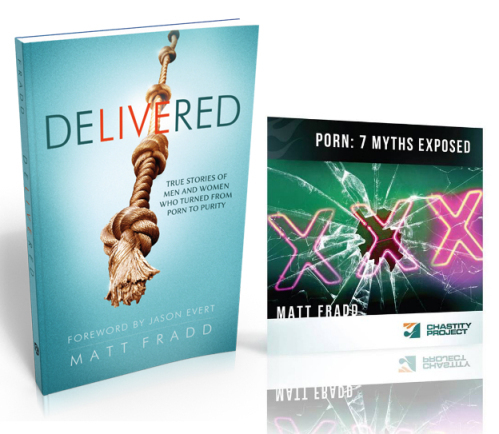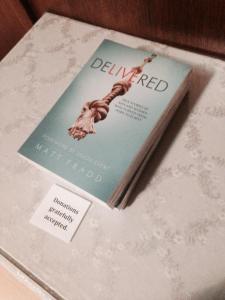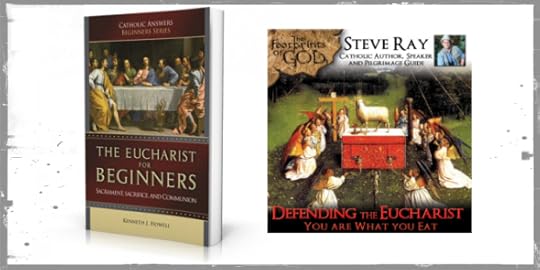Matt Fradd's Blog, page 61
January 30, 2014
Discussing Atheism with Patrick Madrid
Last week Patrick Madrid and I discussed the topic of Atheism, and how to respond to it.
You can read more of what I’ve written regarding atheism here.
Our conversation is about an hour long, so grab a beverage and enjoy!
Some things we mentioned in our chat were:
Atheism in Ireland increases 400%
ps I’ve written a small book that responds to 20 atheist objections. It’ll be put out by Catholic Answers Press around April.
Here’s what Peter Kreeft, professor of Philosophy at Boston College, had to say about the book:
A short and simple book deserves a short and simple blurb. I am happy to supply it for Matt Fradd’s useful little book, 20 Answers to Atheism. It is practical, to the point, and on target. Above all, it’s TRUE.
Stay tuned!
Here’s the audio:
http://ihrarchive.org/archive/rhrn-20140123.mp3
5 Dumb Things People Say About Truth
In this post we will look at 5 self-referentially incoherent things people say about truth and how one might respond.
Self-referentiall incoherence is a logical fallacy in which some claim is made which, upon being applied to itself, refutes itself.
1. “There is no such thing as objective truth!
Really? Is that statement objectively true? If so, is it objectively true that there is no objective truth?
2. “Only that which can be proven scientifically can be called ‘true!’”
Can you prove scientifically that one should only accept that which can be proven scientifically? Hmm, don’t remember seeing that one at the 4th grade science fair.
3. “Everything is true!”
Ah, I see, then you must also believe that nothing is true right? For If the claim, “nothing is true” is not true then it is not true that everything is true.
4. “It’s true for you but not for me!”
Is that statement just true for you, or is it true for everyone? If it’s just true for you then I don’t need to accept it but if it’s true for everyone then it’s not true that all truth is relative.
5. “We should be skeptical about truth!”
If it is true that we should be skeptical about truth then we should be skeptical about the claim that we should be skeptical about truth. But the more skeptical one is about one’s skepticism the more certain one becomes.
To learn more about logical fallacies click here!
January 28, 2014
60 Book Giveaway!
Y’all ready for this? This week, we’re giving away 3 boxes (20 per box) of my new book, Delivered, and 10 mp3′s of my new talk, Porn: 7 Myths Exposed.
Excited? Good!
Thanks For Helping Us!
Before I tell you how to enter to win, let me say that I’ve been really moved at how many people have decided to join us in exposing the evils of porn and sharing the good news that freedom is possible. The boxes have literally been flying off the shelves.*
One man in his twenties, after reading Delivered, wrote this:
Hey Matt, just want to say your book has been a huge blessing. My girlfriend went to one of your talks not to long ago and you had a copy of your book and you gave it to her to give to me. I’m slowly getting back on track of chastity and purity and life has been amazing. Your book has given me hope and encouragement to overcome that area in my life. Hopefully in a year from now I can say I’ve been free from porn. By the grace of God I know I can overcome anything. I also hope to be a chastity speaker one day and inform young people about the purpose of marriage, sex and chastity. Keep up the good work! God Bless
Cheap! Cheap! Cheap!
It’s our desire to get these products into as many hands as possible. That’s why we’ve made them so ridiculously cheap! $2 a book (when you get a box of 20) and $2 a CD (when you get a box of 10). You’ll notice, too, that at the end of the talk we encourage you to burn it and give it away to as many people as you’re able.
I’ve had multiple priests write to me saying that they’ve bought boxes of the book and give them out as penance! Here’s one photo a priest sent me:
Here’s another photo a priest sent me. He wrote, “Here are the books I am taking into the pulpit for my Aquinas homily today.”
How To Win
Porn: 7 Myths Exposed
To win my new talk, Porn: 7 Myths Exposed, enter the raffle below. In a week from today 10 people will be selected at random and sent a mp3 of the talk.
Delivered: True Stories of Men And Women Who Turned From Porn To Purity
To win a box (20 copies) of my new book, Delivered, respond (in the comment section below) to this question: What good would you do with 20 copies of Delivered? In a week from today we will select our three favorite answers and ship you a box of books, no strings attached.**
———-
* And by ‘literally’ I mean ‘metaphorically.’
** I’m not sure if this is a “string” or not, but we will only ship the books to an address in the U.S.
What Are The Five Ways of Thomas Aquinas?
Perhaps the most popular set of arguments for the existence of God are Thomas’ five ways:
The proof from motion, the proof from causality, the proof from the contingency of the world, the proof from grades of perfection, and the proof from finality.
It’s important to keep in mind that these five ways (found in Part I, Question 2, Article 3 of his Summa Theologica) are intended to be a summary, not an exhaustive treatise, of what Thomas thinks are the most convincing arguments for God’s existence.
It’s also worth noting that theists (believers in God) are not bound to think the arguments convincing; as if God’s existence somehow depended upon the irrefutability of Thomas’ arguments.
In fact, if there is an argument for the existence of God more popular than Thomas’ five ways it would have to be the ontological argument, first formulated by Anselm of Canterbury, an argument which Thomas rejected!
In my experience, many Christians have heard of Thomas’ five ways, they have a vague recollection of what they might be, but many have not read what he actually wrote. They are often surprised then to find them quite pithy.
So, on this, the feast of St. Thomas Aquinas, do yourself a favor and read, not a commentary of the five ways – you can read this great one later later - but the five ways written by the man himself:
The First Way – Proof From Motion
The first and more manifest way is the argument from motion. It is certain, and evident to our senses, that in the world some things are in motion.
Now whatever is in motion is put in motion by another, for nothing can be in motion except it is in potentiality to that towards which it is in motion; whereas a thing moves inasmuch as it is in act.
For motion is nothing else than the reduction of something from potentiality to actuality. But nothing can be reduced from potentiality to actuality, except by something in a state of actuality.
Thus that which is actually hot, as fire, makes wood, which is potentially hot, to be actually hot, and thereby moves and changes it. Now it is not possible that the same thing should be at once in actuality and potentiality in the same respect, but only in different respects. For what is actually hot cannot simultaneously be potentially hot; but it is simultaneously potentially cold.
It is therefore impossible that in the same respect and in the same way a thing should be both mover and moved, i.e. that it should move itself. Therefore, whatever is in motion must be put in motion by another.
If that by which it is put in motion be itself put in motion, then this also must needs be put in motion by another, and that by another again.
But this cannot go on to infinity, because then there would be no first mover, and, consequently, no other mover; seeing that subsequent movers move only inasmuch as they are put in motion by the first mover; as the staff moves only because it is put in motion by the hand.
Therefore it is necessary to arrive at a first mover, put in motion by no other; and this everyone understands to be God.
The Second Way – Proof From Causality
The second way is from the nature of the efficient cause. In the world of sense we find there is an order of efficient causes.
There is no case known (neither is it, indeed, possible) in which a thing is found to be the efficient cause of itself; for so it would be prior to itself, which is impossible. Now in efficient causes it is not possible to go on to infinity, because in all efficient causes following in order, the first is the cause of the intermediate cause, and the intermediate is the cause of the ultimate cause, whether the intermediate cause be several, or only one.
Now to take away the cause is to take away the effect. Therefore, if there be no first cause among efficient causes, there will be no ultimate, nor any intermediate cause. But if in efficient causes it is possible to go on to infinity, there will be no first efficient cause, neither will there be an ultimate effect, nor any intermediate efficient causes; all of which is plainly false.
Therefore it is necessary to admit a first efficient cause, to which everyone gives the name of God.
The Third Way – Proof From Contingency
The third way is taken from possibility and necessity, and runs thus.
We find in nature things that are possible to be and not to be, since they are found to be generated, and to corrupt, and consequently, they are possible to be and not to be. But it is impossible for these always to exist, for that which is possible not to be at some time is not.
Therefore, if everything is possible not to be, then at one time there could have been nothing in existence.
Now if this were true, even now there would be nothing in existence, because that which does not exist only begins to exist by something already existing.
Therefore, if at one time nothing was in existence, it would have been impossible for anything to have begun to exist; and thus even now nothing would be in existence—which is absurd.
Therefore, not all beings are merely possible, but there must exist something the existence of which is necessary. But every necessary thing either has its necessity caused by another, or not. Now it is impossible to go on to infinity in necessary things which have their
necessity caused by another, as has been already proved in regard to efficient causes.
Therefore we cannot but postulate the existence of some being having of itself its own necessity, and not receiving it from another, but rather causing in others their necessity.
This all men speak of as God.
The Fourth Way – Proof From Grades of Perfection
The fourth way is taken from the gradation to be found in things.
Among beings there are some more and some less good, true, noble and the like. But “more” and “less” are predicated of different things, according as they resemble in their different ways something which is the maximum, as a thing is said to be hotter according as it more nearly resembles that which is hottest; so that there is something which is truest, something best, something noblest and, consequently, something which is uttermost being; for those things that are greatest in truth are greatest in being, as it is written in Metaph. ii.
Now the maximum in any genus is the cause of all in that genus; as fire, which is the maximum heat, is the cause of all hot things.
Therefore there must also be something which is to all beings the cause of their being, goodness, and every other perfection; and this we call God.
The Fifth Way – Proof From Finality
The fifth way is taken from the governance of the world.
We see that things which lack intelligence, such as natural bodies, act for an end, and this is evident from their acting always, or nearly always, in the same way, so as to obtain the best result.
Hence it is plain that not fortuitously, but designedly, do they achieve their end. Now whatever lacks intelligence cannot move towards an end, unless it be directed by some being endowed with knowledge and intelligence; as the arrow is shot to its mark by the archer.
Therefore some intelligent being exists by whom all natural things are directed to their end; and this being we call God.
January 23, 2014
Singing With My Sister

St. Marks Cathedral in Port Pirie is the church that Carla, Emma, and I grew up going to.
Those of you who are familiar with my story may recall me telling the incident of my friend, Carla, who at the age of twelve (or there abouts) told me that she was thinking of committing suicide. I had no idea what to say. No hope to offer.
After my conversion to Christ at the age of seventeen I came back from World Youth Day in Rome walking on another plane of reality. I had encountered Christ and wanted everyone to know about it (whether they did or not).
About a year later, my friend Carla (who was thankfully still around) also converted to Christ.
At some point after her conversion, Carla began writings songs to Christ. One of them is entitled Love Me More. Recently my sister, Emma (see her music here) and I played the song live at a local coffee shop. Here it is (the lyrics can be found underneath)!
Love Me More
Walking down this windy road,
Looking for a place to go,
but I was already lost before I started.
I’ve let you down so many times,
And you just forgive all my stupid crimes,
They dissapear like a drop in the ocean.
I swear, I’m not hiding,
I’m just lost; come and find me.
I’m lost, so come and find me.
I can’t believe you have faith in me.
You’ve hungered for me before I could see.
Could you be mine to keep?
‘Cause you’ve done so much for me,
I can’t believe that you’ve set me free,
But I was already lost before I started.
I swear, I’m not hiding,
I’m just lost; come and find me.
I’m lost, so come and find me.
Because you love me more than Miley Cryus* loves the paparazzi;
More than my Dad loves to play on the pokies**;
More than anyone on this earth ever could.
———-
* Carla originally had “Lindsey Lohan,” but given recent events…
** Pokies is Australian slang for poker machines, something her Dad may have been addicted to.
Filed under: Uncategorized








January 21, 2014
Questions on Marriage (mp3)

Cameron and me on our wedding day.
Last week my wife and I had the honor of speaking on the topic of marriage to a large group of Chaldean Rite Catholics (Yes, Roman Catholicism isn’t the only “type” of Catholicism).
The talk was entitled, 7 Things You Need To Know Before Getting Married.
Many of you asked us to record and share the talk. Unfortunately the audio quality of the talk itself wasn’t good enough; the audio quality of the Q&A, however, came out well, though many of the questions asked are inaudible.
Enjoy!
Download: marriage_edt.mp3
Download here.
Here are the questions that were asked:
1. What about pornography in marriage?
2. How to I explain so called “same-sex marriage” to my kids?
3. Can you talk about why it’s important to pray for your future spouse, and the blessings that come from praying the family rosary?
4. How did you convert from agnosticism to Catholicism (here my story on The Journey Home here).
5. You said we should put God before our marriage? How do we do that?
6. How do you find commonality with your spouse?
7. Have you both read a book independently that you both enjoyed?
8. Do you find it frustrating that you’re into reading and theology and stuff and your wife doesn’t?
9. I’ve often heard that men shouldn’t put their job before their marriage. Any advice on that?
10. Talk about the problem that arises when family members try and get in the way of your marriage. How do we make sure we don’t go to bed angry with each other.
11. We’re seeing, in our community, long, loooong engagements and couples even sleeping together. How did you stay pure during your engagement?
Filed under: Sexuality








Interview with NoFap Founder
 I recently spoke with Alexander Rhodes, the founder of nofap.org.
I recently spoke with Alexander Rhodes, the founder of nofap.org.
Nofap began as a space for atheists and agnostics to encourage each other to be free of porn and masturbation.
They have a humorous way of motivating each other. Note the picture over there which comes from their FB wall. ——->
Heads up: Some of the content on nofap.org can be somewhat vulgar. Please don’t understand my interview with Rhodes to be an uninhibited endorsement of his site. I think, however, that as Christians, we should affirm goodness, truth, and beauty wherever we encounter it, and I encountered much of it in the work Rhodes is doing.
Before our interview here are a couple of terms you should be aware of.
Fap = slang for masturbation.
PMO = porn, masturbation, orgasm.
Matt: Alexander, tell us a little about nofap and its origins.
Alexander: I started up NoFap in June 2011 after a Chinese journal article hit the frontpage of reddit. It explained that after abstaining from orgasming for a week, men’s testosterone levels temporarily raised. This started buzz about “the seven day challenge” throughout the comments section of the website.
At the time I was excessively masturbating to internet porn and before I saw this journal article, I was already thinking I should probably take a break.
The article and reddit-wide discussion about it inspired me to create a place to host week and month-long challenges to abstain from masturbation.
In the beginning it wasn’t geared towards any sort of self-help initiative. It was simply a place to take a break from masturbation. But since the small group of us stopped masturbating for a period of time, naturally we stopped watching so much porn. And we began to experience tremendous benefits in our lives; we wanted to experiment with the program more frequently and for longer periods of time. Around the same time people in other areas of the internet started to realize some of the negative effects of porn… they found NoFap.
All of this stuff compounded to make NoFap one of the most popular porn-recovery communities in existence.
Matt: Now, you yourself don’t identify with any religion, you shared with me that you’re an agnostic, so what motivates you, Alexander, not only to be porn/masturbation free yourself, but to help others do the same?
I’m still figuring things out… but I’m not religious at all. Agnostic would probably be the best word. Love is my motivation. My excessive masturbation and porn use contributed to me hurting women I care about. My excessive porn use and my attempts to indulge my porn-infused fantasies and expectations made my partners feel used, objectified, and “not enough”.
Love is the infinite energy source I tap into for motivation. For myself, abstaining from PMO is all about reconnecting intimacy, empathy, love, and affection to sex.
Porn doesn’t just effect the consumers – it often effects the dynamics present in their interpersonal relationships. Not to mention the sexual assault, sexually transmitted infections, and manipulation present in the porn industry…
Matt: How is the atheist/agnostic community responding to the work you’re doing?
Alexander: Very well. According to a few surveys we’ve conducted, the majority of NoFap’s userbase identifies as atheist or agnostic. I think that people, religious and non-religious alike, appreciate my secular approach to the issue.
Matt: Would you say one of your goals is to help people be completely porn free, or are you mainly interested in helping them gain control of their use of it? In other words, do you consider pornography to be an evil to humanity? Something that always stunts human flourishing? Or do you only see it as a problem with it becomes addictive?
Alexander: I like to compare pornography to cigarettes. For the consumer, it is always a harmful thing to consume. Some people are able to smoke, in moderation, without too many consequences. But that is rare. Most people, especially those who binge (chain smoke), experience larger negative repercussions. Like cigarettes, porn seems to be very addictive.
So I guess I’m not demonizing it. But I think it’s generally bad. Overall I dislike it and encourage people to live life porn free.
Matt: What would you say to an atheist who said, “Hey, if God doesn’t exist, all things are permissible, porn helps me relax I enjoy it, therefore I’m gonna keep doing it.
Alexander: I’d say “ok, have fun”. I try not to push my views too hard on other people. I present them the overwhelming anecdotal evidence that porn is bad… and if they want to argue the point, I like to live and let live. If porn is hurting them or those they care about, they’ll figure it out eventually and my website will be there to help them quit.
Matt: Can you share with us any victory stories those on your forum have shared?
There are so many to choose from and success stories help fuel the work I’m putting into NoFap. From saved relationships and marriages to profoundly changed lives, NoFap has it all. But because of my own personal motivations, I really like hearing from those involved with previous heavy-porn users.
One person wrote:
Last night, I told my wife I had joined an online support group for my PMO addiction. I told her about all you great people and how you encourage each other and share your success stories. She started crying, but it wasn’t tears of sadness. She wasn’t walking away, like she needed to when I first told her about my porn problem. They were tears of joy, and she was walking towards me, to embrace me. She was thanking me. Porn ostracizes you from your loved ones. It separates you. What we do here… it brings you together.
Filed under: Pornography








January 18, 2014
A Succinct Defense of Marriage
This is perhaps the best, succinct argument for marriage that I’ve heard.
I encourage you to watch it several times and then share it with friends.
It was offered by Ryan Anderson to the Indiana House Judiciary Committee earlier this week. Anderson is the co-author of the book, What Is Marriage? Man and Woman: A Defense. One of the other co-authors, Sherif Girgis, is a regular guest on Catholic Answers Live. You can (and should) listen to one of his shows here.
Wonder what it must be like to be both a faithful Catholic and a person with same-sex attraction? Read Catholic, Gay, and Feeling Fine by Steve Gershom
Filed under: Apologetics, Sexuality








January 15, 2014
Did Jesus build his Church upon Peter?
In the following 7 minute interview I (very) briefly answer the following three questions:
1. Was Peter primary among the apostles?
2. Was Peter the rock upon which Christ would build his Church?
3. How can Peter be the foundation when 1 Corinthians 3:11 says Jesus is?
Here is the audio clip, followed by the text we focused on. Enjoy!
Download: matt-fradd-1-14-14.mp3
And Jesus answered him, “Blessed are you, Simon Bar-Jona! For flesh and blood has not revealed this to you, but my Father who is in heaven.
And I tell you, you are Peter,and on this rock I will build my church, and the powers of death shall not prevail against it.
I will give you the keys of the kingdom of heaven, and whatever you bind on earth shall be bound in heaven, and whatever you loose on earth shall be loosed in heaven (Matthew 16:17-19).
In the interview I mentioned that even Protestant authorities (oxymoron?) concede that, in Koine Greek, there was no distinction between petra and petros. And that Petros himself is the petra.
For example, one of the most respected Greek dictionaries among Protestants is Gerhard Kittel’s Theological Dictionary of the New Testament. Here’s what it has to say about Matthew 16:18:
The obvious pun which has made its way into the Greek text . . . suggests a material identity between petra and Petros . . . as it is impossible to differentiate strictly between the two words. . . . Petros himself is this petra, not just his faith or his confession. . . .
The idea of the Reformers that he is referring to the faith of Peter is quite inconceivable. . . . For there is no reference here to the faith of Peter. Rather, the parallelism of “thou art Rock” and “on this rock I will build” shows that the second rock can only be the same as the first.
It is thus evident that Jesus is referring to Peter, to whom he has given the name Rock. . . .To this extent Roman Catholic exegesis is right and all Protestant attempts to evade this interpretation are to be rejected. [1]
For more quick answers to objections to the faith, click here!
———-
[1] Thanks to Tim Staples for sharing this with me.
Filed under: Apologetics








January 14, 2014
Who Wants to Be an Apologist?
Every other week I hold a competition called Who Wants to Be an Apologist? In which I propose an objection to the Catholic faith and invite you, the reader, to answer it.
1 Peter 3:15
It’s my hope that this series of posts will help you become a better apologist, so that you may ”always be prepared to make a defense to any one who calls you to account for the hope that is in you (1 Peter 3:15).
Before the objection, here are the prizes!
The Prizes
1st Prize winner will receive the book, The Eucharist for Beginners by Kenneth J. Howell by Catholic Answers Press (shipping included) and my fellow apologist Steve Ray’s great talk Defending the Eucharist: You Are What You Eat (mp3). Learn more about Steve here.
2nd and 3rd Prize winners will get Steve’s talk (mp3).
To be eligible your answer will need to be in no later than Tuesday the 20th at 9am (PST). We also ask that your answer be no more than 350 words. Also, I’m sorry, I can’t send the book outside the US (too much). You can still win the mp3, though!
The Objection
Catholics often point to the words of Jesus, who said, “This is My blood…” and ”This is my body…” That’s fine. No one denies that. What Catholics fail to recognize is that Jesus frequently spoke in spiritual terms:
“I am the bread of life,” (John 6:48).
“I am the door,” (John 10:7,9).
“I am the resurrection and the life,” (John 11:25).
“I am the true vine,” (John 15:1).
In the context of John 6, Jesus is telling His disciples that they must eat His body and blood (John 6:53). He clearly says He was speaking in spiritual terms, “…the words that I have spoken to you are spirit and are life,” (John 6:63).
I’m looking forward to your answers! Let’s take this opportunity to learn how to defend this doctrine through, not only personal study, buy by reading each other’s answers!
ps. Please share.
Filed under: Who Wants to Be an Apologist?








Matt Fradd's Blog
- Matt Fradd's profile
- 168 followers













